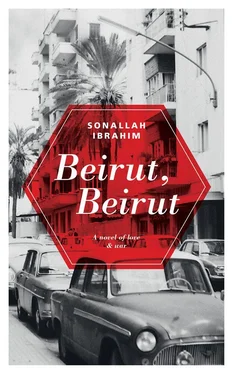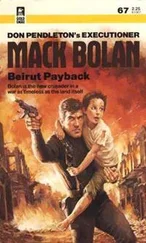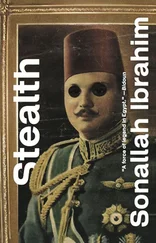Perplexed, I looked up at him.
“Carlos who?”
And suddenly I remembered, and smiled in spite of myself.
He jabbed a finger at me in a state of agitation.
“There — so you know!”
“You mean the international terrorist,” I said.
He grew even more agitated.
“That’s him exactly.”
“But what do I have to do with him?” I asked.
He pounded the dossiers with his fist.
“Sir,” he said in exasperation. “You should be talking candidly with me the way I am with you. We have information that you know him well.”
“Not true.”
“Our information has been corroborated.”
“Your information is wrong. I have nothing to do with terrorism or politics. I came to Beirut to publish a book, that’s all.”
He smiled wickedly.
“And what about the film?”
“What about the film?” I riposted sharply. “They asked me to write a voiceover for it. And why wouldn’t I do that? That’s my job.”
“So what’s the story with Carlos?”
“There isn’t any story. What I’ve told you is everything.”
He began examining me closely. He seemed to be uncertain about which of two options to take. Then he came to a decision, and slumped into his seat. He took the cigarette out of the holder and put it out in the ashtray, telling me, “Sir. Listen to what I’m going to tell you. We aren’t able to rescue a person in your circumstances every day. If we succeed today, then perhaps we won’t be able to the next time. My advice to you is to stay away from troublesome matters. If you find yourself in a fix, maybe you can turn to us. We hold some strings, and we can pull on some others.”
He picked up a card from the brass tray and handed it to me, saying, “Here’s my name and number. There’s no need for you to come here or for us to meet. You only have to pick up the phone and talk to me. Afterwards, you will find that we can show our gratitude. On the right occasion. This book you were talking about. Have you found a publisher for it?”
“Not yet,” I said.
“Give me a copy of the manuscript, and maybe we’ll find you one,” he offered.
“Unfortunately, I don’t have any more copies.”
He stood up and reached for my passport, my notebook and the rest of the papers that had been in my pockets. I stood up too, and took them from him.
“I had around two hundred lira with me,” I said.
“That’s all we got from your kidnappers,” he explained as he pressed a buzzer on his desk. “If you need cash, perhaps I could loan you some.”
He put his hand in his pocket, but I stopped him, saying, “There’s no need. I don’t need anything. I will manage.”
I insisted on refusing, and he took his hand out of his pocket. The escort from the car entered the room, and the colonel addressed him, saying, “Accompany this gentleman to the gate and call him a taxi.”
I shook hands with him to say goodbye, and left the office. I walked ahead of my escort to the floor below, the marble staircase, and then the outer gate.
The taxi made its way in the dark of night through deserted streets and dusty fence-walls, and groups of gunmen affiliated with different groups. Some of them stopped us and then let us pass. We finally reached Hamra, and then pulled up to the house.
I looked for Abu Shakir, but couldn’t find him. I went up the stairs at a run, hoping Wadia would be there. I knocked on the door, and he opened it for me. As soon as he saw it was me, his jaw dropped in astonishment, and he gave me an affectionate hug.
I asked him to pay the taxi fare, and hurried to the kitchen. I took a can of beer out of the fridge, and drank it in one gulp. I brought another one out with me to the living room.
I lit one of Wadia’s English cigarettes, and walked up to the telephone. I dialed Lamia’s number, and a child’s voice answered. Then her voice came on the line: “You?”
“Is someone with you?” I asked.
“Yes,” she said, whispering. “Where have you been?”
“I’ll tell you everything when we meet. Maybe in half an hour?”
“That’s impossible,” she said. “I can’t go out.”
“Then I’ll come to you,” I suggested.
“That’s more impossible.”
“At your office?”
“I’ll be waiting for you at the office in the morning,” she said in a normal-sounding voice.
“I’ll come on one condition.”
“What’s that?”
“That you wear your hair in a ponytail.”
She laughed. “No problem,” she said.
“And another thing. Don’t wear a bra.”
“What?”
“Your breasts don’t need a bra.”
“In the past, I didn’t wear one, but now I’m older.”
“Not at all. Promise me?”
She laughed again. “I’ll see,” she said. “ Bye-bye .”
I heard Wadia’s voice behind me as I put the receiver down, and I turned to him. He was looking at me nervously as he lit a cigarette.
“A real miracle. A kidnap victim comes back — and so quickly. Everyone will be eager to buy the interview I’ll be doing with you.”
I scrutinized his face carefully, as though I were seeing him for the first time.
“How did you know I was kidnapped?” I asked as I opened the second can of beer.
“When I noticed you weren’t sleeping at the house, I called Antoinette, Lamia and Safwan, and everyone who knows you. But none of them had seen you. There was no other explanation. Antoinette promised me she would prod the apparatus of the Palestinian resistance into action. Listen: you must be hungry.”
“Like a dog,” I said. “I want meat and whiskey. And first of all, a bath.”
“Go take a bath. I’ll get everything ready for you.”
“Did Safwan mention anything about the book?” I asked as I headed to my room.
“He said he can’t publish it in the current circumstances,” he answered.
I brought clean clothes from my room, and carried the can of beer to the bathroom. I took off my clothes and put them in a pile in a far corner. I brushed my teeth, then ran hot water in the bathtub. I shaved as I drank the beer. And finally, I sat down in the tub and leaned my head against the wall. I raised the beer to my lips.
But it wasn’t long before my happiness disappeared. My bowels moved for the first time in two days. The reason wasn’t that they would imminently be returning to normal regularity. Rather it was the idea that began to nag at me.
I finished my bath, put on my clean clothes, and went out to the living room. I found that Wadia had brought from outside two chickens grilled over charcoal, with familiar plates of salad. I recounted to him, while we ate, how I was kidnapped, and the conversation that took place between me and the fanatical Phoenician, and then the conversation between me and the man from the Deuxième Bureau.
Puzzlement came over him when he heard about the question that the man from the Deuxième Bureau had asked me about Carlos, and he muttered: “Strange. What did you tell them?”
“The truth.”
He looked bewildered. So I added, “I mean that I don’t know anything about him.”
His face went pale. “Is that true?” he asked.
“Of course.”
“But you told me…”
I laughed. “You’re the one who misunderstood.”
“Strange,” he repeated, astonished.
I dipped a mouthful of food into a plate of yogurt and crushed garlic. “Really strange,” I said. “I only mentioned Carlos’s name once. In this living room, during a conversation with you. So that means only one thing.”
He stopped eating and looked at me expectantly.
“What’s that?”
“Either you had a chat with someone about the conversation we had…”
Читать дальше












